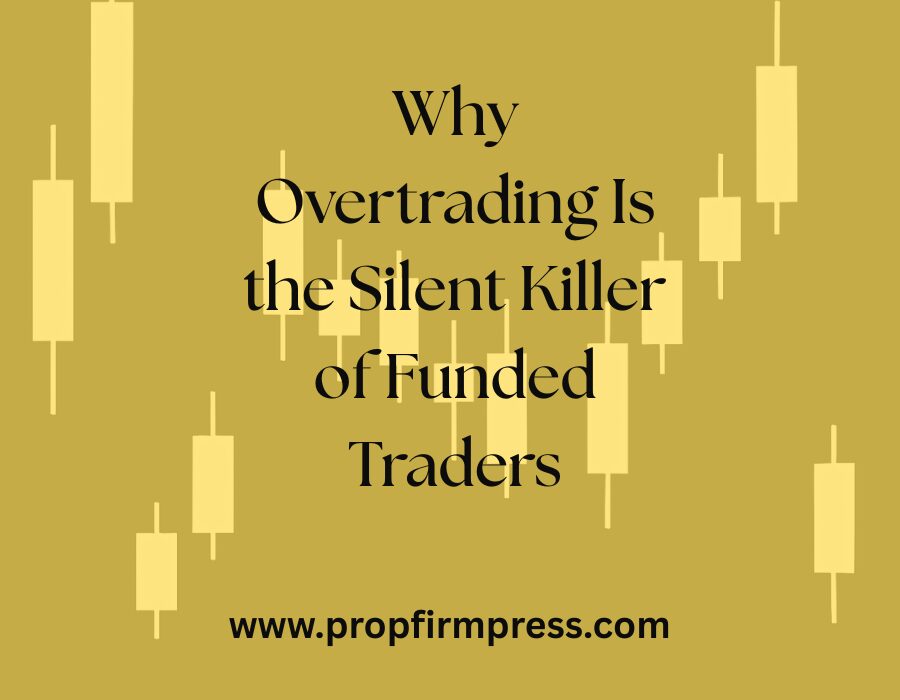Why Overtrading Is the Silent Killer of Funded Traders
For traders who’ve successfully passed a prop firm challenge, securing a funded account feels like crossing the finish line. But in many ways, it’s just the beginning. What often leads to failure at this next stage isn’t poor strategy or bad luck—it’s overtrading. This hidden enemy silently erodes capital, increases stress, and ruins consistency. If you’re trading with Funded Trading Plus or Top One Futures, managing trade frequency becomes essential for long-term success.
What Is Overtrading?
Overtrading is the excessive execution of trades, either due to emotional impulses, the urge to recover losses, or chasing after market activity without proper analysis. It can occur even when the trader is profitable, simply because they want to make more. In prop trading, this behavior quickly triggers drawdown limits or daily loss thresholds, often leading to account termination.
Why It Happens After Getting Funded
Once traders get funded, they often feel the pressure to “perform.” Some of the triggers include:
- Fear of losing the funded account
- Greed or excitement after a few winning trades
- Feeling the need to trade every day to justify the opportunity
- Lack of structure or trading rules
Ironically, the very behavior that helped them pass the challenge—discipline and selectivity—often disappears once they’re funded.
The Cost of Overtrading in a Funded Environment
Prop firms like Prop Shop Traders or Instant Funding impose clear limits on daily losses and overall drawdown. Overtrading makes it much more likely you’ll hit those limits, not from one bad trade, but from death by a thousand cuts.
Here’s what overtrading can do to your performance:
- Decreases win rate due to lower-quality setups
- Increases emotional fatigue and decision fatigue
- Leads to inconsistent risk management
- Makes reviewing your journal and stats meaningless
How to Identify Overtrading in Your Routine
Ask yourself these questions:
- Am I trading more than 3–4 times per session without a planned reason?
- Do I feel anxious when not in a trade?
- Do I chase trades after missing a move?
- Have I made back-to-back trades after a loss?
If you answer “yes” to two or more of these, overtrading might be hurting your results.
Strategies to Stop Overtrading Immediately
1. Set a Maximum Daily Trade Limit
Decide how many trades you’ll take—win or lose. Common guidelines include 3 trades max per session. Once that number is reached, close your platform and walk away.
2. Pre-define Your Trade Criteria
Use a checklist before every trade. For example:
- Does this trade align with my strategy?
- Is the setup at a key zone?
- Is volume confirming my thesis?
If even one item is missing, skip it. This builds quality over quantity.
3. Use Journaling Tools to Track Frequency
Apps like Prop Firm Press‘s downloadable journal sheets allow you to track number of trades, time per trade, and win/loss stats. Seeing trends visually often deters overtrading naturally.
4. Trade Only Specific Hours
Define a 2-hour window each day for your trades—such as the first two hours after the NY Open. Limit trading outside of those hours unless there’s a news-based event or pre-planned setup.
5. Reward Non-Trading Discipline
If you skipped trading because no valid setups appeared—celebrate that. Write in your journal: “No trades today because my criteria weren’t met. That’s progress.”
6. Turn Off the P&L
Remove monetary gains/losses from your view during the session. Focus on execution. When you trade to reach a number, overtrading becomes inevitable.
7. Have a Checklist for Ending the Session
- Did I follow my trade plan?
- Did I exceed my trade limit?
- Did I trade emotionally?
- What would I do differently tomorrow?
Answering these helps you recalibrate and reduce the risk of repeating mistakes.
Rebuilding After Overtrading
If you’ve already overtraded and lost your funded account, don’t panic. Use the data. Look back at your journal and identify the moment where you deviated from your plan. Create a rule that blocks similar behavior going forward—such as locking your account after 3 trades or journaling after every loss.
Overtrading is not a character flaw—it’s a lack of process. With tools, structure, and accountability, you can eliminate this silent killer and build a track record that makes you not just funded—but consistently profitable.
